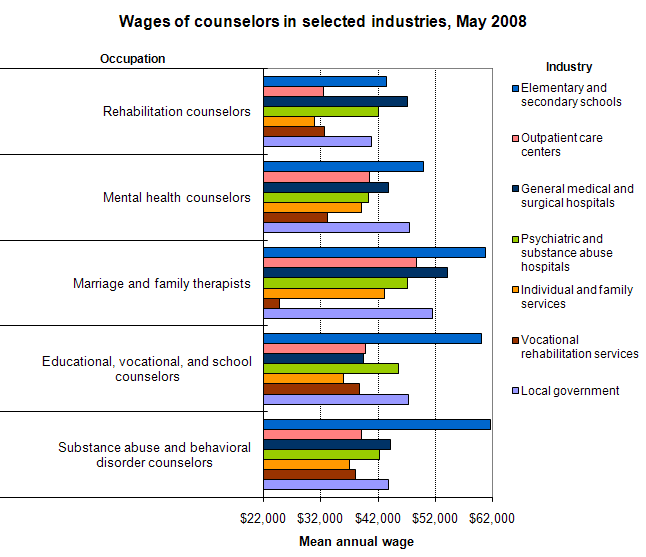Many people find a career in counseling very rewarding. Counselors have an opportunity to help people and improve their lives. While the job can be difficult at times, many find that it is encouraging to be able to help others work through their problems. A career in counseling can provide you with so much more than a regular salary. It can provide you with a sense of fulfillment as you watch others make progress in their lives.
Career Opportunities in Counseling

Your career path in counseling depends on your personality and your interests. However, a desire to help others, as well as a sympathetic nature and the ability to listen, are essential for those who are interested in pursuing a career in counseling. There are a number of different career specialties you can choose from:
- Marriage and Family: Marriage and family therapists help families learn to work better together. They also provide guidance for couples and families trying to find improve their relationships.
- School Guidance: School counselors help children in elementary, junior high and high school find their personal, social, and educational goals. This includes helping them overcome behavioral and social issues, as well as helping them decide on a career and higher education path.
- Career Guidance: If you interested in career development and you enjoy helping others, a career counselor might be a good fit for you. Career counselors provide help for adults and students looking to improve their skills, and looking for help in their job search.
- Mental Health: Depression and other issues related to mental health can be difficult to overcome. Mental health counselors work with their clients to help them cope with difficult situations. These counselors also help family members learn how to manage their relatives with mental health issues.
- Rehabilitation: Rehabilitation counselors work with people that have physical and mental disabilities. Rehab counselors also help people who were hurt on the job, older people with health problems, and people recovering from alcohol or drug problems.
- Substance Abuse: Substance abuse counselors help others get their addictions under control. They also work closely with families of addicts by organizing support groups.
Earning Potential
The area of specialty you decide to pursue will determine your salary potential. According to The Bureau of Labor Statistics, annual salaries for counselors are as follows:
- Rehabilitation counselors had the lowest overall mean wage of these occupations. Their largest employer, vocational rehabilitation services, was low paying across occupations.
- Educational, vocational, and school counselors was the highest paying of these occupations. This occupation was concentrated in elementary and secondary schools, an industry that paid relatively high wages to counselors.
- Elementary and secondary schools paid the highest wages for four of the five types of counselors. Vocational rehabilitation services and individual and family services had the lowest wages of counselors from the industries shown.
- The selected industries all employed relatively large numbers of counselors. Individual and family services employed a particularly high number of each type of counselor.
- Other industries employing counselors include State government; residential mental retardation, mental health and substance abuse facilities; and colleges, universities, and professional schools.

Work Environment
If you want to be a counselor, you have some options regarding where you want to work. After receiving your degree and fulfilling any state licensing requirements that you may have, you can decide where you want to work. There are a number of opportunities in a wide variety of places. Some of the options you have include:
- Working at a school: Guidance counselors are found in both elementary and secondary schools. In fact, some states require elementary schools to employ counselors. However, some institutions require counselors to also have a teaching license.
- Work at a clinic. There are a number of clinics set up for different purposes. Rehabilitation clinics, substance abuse treatment centers and mental health clinics all employ counselors. Even at clinics focused on physical aspects, counselors are often sought after, since they can help patients work through their issues related to their other problems.
- Open your own practice. Another option is to open your own practice. You can start a business based on your area of expertise. However, in many cases it helps to start out at a clinic so that you have the chance to gain experience and build a client base.
Getting a Degree in Counseling

Many employers now require counselors to have a master’s degree. It is possible that you can start work with a bachelor’s and then work on a master’s degree afterward. You can work on a master’s degree in counseling at a more traditional institution, or you can get an online master’s degree in counseling.
Whichever route you decide to take, it is a good idea to consider the reputation of the school. Technology has made it possible to get a good quality education online, and there are schools that offer respected online programs for counseling students. Check program rankings to find a good degree program. You should also consider the teachers the program offers, as well as the length of time it takes to complete the program. Find a master’s in counseling program, whether online or at a brick-and-mortar, that fits your needs.
When choosing a master’s degree in counseling, it is a good idea to consider whether or not you are going to get a professional degree or an academic degree.
- A professional master’s degree focuses more on helping you improve skills in your profession. You might get a professional degree to help you advance your career, or to fulfill a stipulation set by your employer. Among the most popular professional master’s degrees are the Master of Social Work and the Master of Education. It is important to note that in most cases a professional degree will not prepare you for academia. While you will still be able to work in schools at the primary and secondary level (an M.Ed. is often preferred), most universities require an academic degree.
- An academic master’s degree in counseling is marked by its rigorous requirements. You’ll conduct extensive research and write a thesis, depending on whether you get a MA (Master of Arts) or a MS (Master of Science). An academic degree is considered to be quite versatile, preparing you for professional or academic work. Although, to continue in academia you may need to pursue a Ph.D. in your area of concentration.
Licensing Requirements
In addition to choosing the right school, it’s important to consider the licensing requirements in your area of specialty. You’ll want to make sure the school you attend adequately prepares graduates for the exam(s). LPC (or LCPC, LMHC, etc.) licensure is the most common and recognized in the United States. Professional counselors must be licensed in order to practice independently and enter private practice.
For more information on counselor licensure, visit the following sites:
- American Association of State Counseling Boards: Lists contact information of all state counselor licensure boards.
- National Board for Certified Counselors (NBCC): NBCC certifies general counselors (NCC), clinical mental health counselors (CCMHC), school counselors (NCSC), and addictions counselors (MAC: Master Addictions Counselor) in the United States.
- Commission On Rehabilitation Counselor Certification (CRCC): The CRCC sets the certification standards for rehabilitation counselors (CRC and CRC-MAC) in the United States and Canada.
Bottom line: The counseling field offers rewarding and challenging job opportunities, and depending on where you work and what area of specialty you pursue, your earning potential might exceed the national average. Review our list of accredited schools to find a program that meets your career and academic goals.

